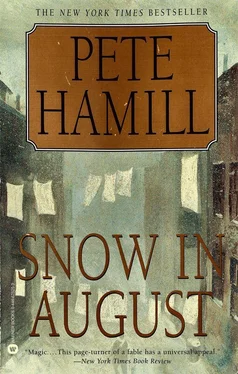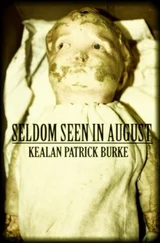“Name, age, employment, number of years in this apartment.”
“Kathleen Devlin. Thirty-four. I work at the RKO Grandview. We’ve been here since 1940.”
“Where’s your husband, lady?” the sallow cop said.
“In Belgium.”
“Whatta you mean, Belgium?”
“He’s buried there. That’s where he died,” she said, and pointed toward the roof. “Fighting people that used that sign.”
Carmody saw the framed photo of Tommy Devlin for the first time, cleared his throat and looked at his partner. His face flushed. They were both more polite now.
“Yeah, well, ya know, Mrs. Devlin, this is really a matter for the detectives, and they can’t do much at night.” He closed the pad and stood up. “But we’ll go up the roof and make sure everything’s okay, all right? Don’t touch nothing.”
They went out and Michael could hear their heavy feet moving on the roof above the kitchen. His mother washed the teacups in silence. And he loved her a lot for what she had done. He had never heard her use her husband’s death to make people feel sorry for her. Never. And she hadn’t done it with the cops either. It was more like telling them that if her husband could die doing his job, they could try doing theirs . She didn’t weep in public. She didn’t fly the flag like the patriots. She had a mass said every year around Christmas on the anniversary of her husband’s death. But that was all. Some things, she always said, you kept to yourself. Now both of them had called up the memory of Tommy Devlin on the same day.
“Mom, could my father dance?”
“Why do you ask that , son?”
“I was wondering about it,” he said. “Rabbi Hirsch told me that he’d never had time to dance with his wife. And, I, well—”
“He was a wonderful dancer,” she said. “We used to go on Saturday nights to the Webster Hall in Manhattan. In the summer, we danced at Feltman’s in Coney Island. He could jitterbug, all right, and he danced a lovely fox trot. But his favorite was the waltz. Mine too.”
A waltz, Michael was thinking, what is a waltz? And was thrilled at the image of his father dancing. He had imagined him doing a slow jitterbug, smiling and graceful, but now that he knew that Tommy Devlin really could jitterbug, he had trouble imagining this other dance, a waltz. Kate seemed to read his mind.
“That’s the dance that goes one-two-three, one-two-three,” she said. “Here, I’ll show you.”
She took his hand and put another on his waist, and stepped, one-two-three, one-two-three, moving him in the tight space between the table and the sink, and then humming a tune. Do-do-da-dee, da-da da-da, do-do-da-dee …
“That’s Strauss,” she said. “‘The Blue Danube.’ Sure, you’ve heard it before.” He had. “They’re always playing it on Rambling with Gambling , in the morning.” He pictured his father dancing with her, in some ballroom out of a movie, and then Rabbi Hirsch offering a hand to his wife. And then saw a flashlight beam scanning the backyards.
He released her hand and moved to the window. The lights went on in one of the Collins Street apartments, and he could see an annoyed Mr. Rossiter gazing up at the source of the light beam. Michael opened the window and leaned out to see better. He could hear his mother turn on the hot-water tap for the stacked dishes.
“Be careful there, Michael. Don’t, for God’s sake, fall out.”
“No way.”
Then the flashlight beam held on something, and he could hear urgent voices from the roof, and sure enough, there it was, lying in some weeds. The paint can.
“Mom, you’re better than Sherlock Holmes,” Michael said.
She came over to the window, drying her hands on a dish towel.
“Glory be to God,” she said.
“I better tell them it’s Sapolin number 3.”
“Of course, my dear Watson.”
They both laughed, and after the flashlights vanished from the yards, they shut the window. Kate Devlin went to her chair and her book, and Michael went to bed. Lying in the dark, remembering the few graceful steps his mother had taught him, humming softly the melody of “The Blue Danube,” he tried to picture a waltz. He must have seen many waltzes in the movies and didn’t know their names. There were always dances in those boring movies set in earlier centuries, where Englishmen wore wigs and wrote with feathers, and the long, satiny women’s gowns exposed parts of pale breasts. Those movies were hard to follow, because when the Englishmen talked so did all the kids in the Venus; they shut up only when the men were riding horses, dueling with enemies, or stabbing each other in marble castles. Certainly they must have waltzed in Emperor Rudolf’s castle. And he remembered from geography class that the Danube flowed right through Vienna, where Rabbi Hirsch’s mother went after leaving him behind. He wondered whether the Vltava itself flowed past Prague into the Danube.
Then he imagined his father in a tuxedo, like a bigger, darker version of Fred Astaire, waltzing with his mother across the gleaming floor of the Webster Hall. It was long before the war, even before Michael was born, and the music soared, and everybody stepped aside to watch, and his father and mother never got tired. Then, at the far end of the vast ballroom, Rabbi Hirsch stepped forward with Leah, and he was as young as Michael’s father, his face blissful, and he bowed to his wife and started his waltz too.
At daybreak of Easter Monday, when Michael awoke, he saw two detectives in raincoats and porkpie hats down in the yards. They took the paint can away and then came to their house and made photographs of the door and some footprints and took another statement from Kate and Michael. They weren’t the same detectives who had arrested Frankie McCarthy. Abbott and Costello must have had the day off. But they knew about the swastikas at the synagogue and they knew about what had happened to Mister G.
“You oughtta try to remember what happened that day, kid,” one of the detectives said to Michael. “You’re gonna need some help someday.”
Michael said nothing. The detectives went away, and the next day, after school, Michael went to Mr. Gallagher’s and bought some solvent and some black paint with money his mother had given him. She had cleared the costs with Mr. Kerniss, the landlord that Michael had never seen. While she was at work, Michael scrubbed the red paint off the floors of the hallways. Then he painted over the swastikas and the words on the floor. But 378 Ellison Avenue felt dirty now. And somehow frail. He knew they would never feel safe there again.
For weeks, nothing happened. Everybody had heard about the swastikas, but there were no arrests. Frankie McCarthy drifted around the parish like a ghost, but he ignored Michael, Sonny Montemarano, and Jimmy Kabinsky. Even so, Michael didn’t completely relax. The weather was warm and breezy now, and all the other kids of the parish were back on the streets. He played stickball on the crowded courts of Collins Street, hitting balls farther than ever, but often striking out when he glimpsed any of the Falcons coming along Ellison Avenue. If he was bigger this spring, so were the Falcons, and they moved like they were the true rulers of the parish.
Pushed by Rabbi Hirsch to study, study, study, Michael worked a little harder at his homework and his grades moved into the low 90s. He still traded for old comics and bought new ones and read them in his room. He found a magazine called Hit Parader and learned the words to new songs and passed the lyrics to the rabbi. Now he would hear the rabbi suddenly begin to sing “Zip-a-Dee-Doo-Dah” or “Cool Water” and, best of all, “How Are Things in Glocca Morra?” which he promised to sing for Michael’s mother at next year’s seder.
Читать дальше












